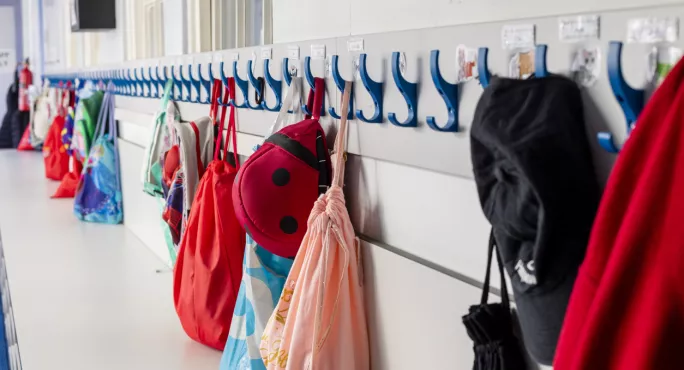- Home
- News
- Early Years
- ‘Just 3%’ of nurseries say they can maintain provision
‘Just 3%’ of nurseries say they can maintain provision

Only three per cent of early years settings, including maintained nurseries, have said they will be able to continue providing their current level of services or places as the sector warns of a “very real crisis”.
These figures come from a survey of mostly maintained nursery schools carried out by the Early Education organisation, which will be published in a full report next week.
They have been revealed today in a letter the organisation and three unions have written to the government urging it to deliver on its “ongoing commitment to addressing the crisis in early years funding”.
The letter, seen by Tes, has also been signed by the NEU teaching union, the school leaders’ union NAHT and Unison, and has been sent to the education secretary Gillian Keegan and the treasury today ahead of the Budget on Wednesday 15 March.
It comes ahead of the publication of a new survey of 95 maintained nursery schools and 30 private, voluntary and independent sector providers/childminders.
- Walker: Increasing early years funding ‘more effective’ than catch-up
- EYFS: Disadvantaged pupil levels hits new record in 2022
- School funding crisis: ‘The mood among leaders is desolate’
The survey asked settings: ”What is the outlook for your school or setting in the light of current funding pressures?”
It found only three per cent of respondents expected to be able to continue their current levels of service in 12 months’ time.
About four in 10 (39 per cent) of respondents said that the future was secure for the next 12 months but not beyond, while 18 per cent said they were unsure whether they would be able to continue for the next 12 months with the current funding.
The letter to the education secretary and the chancellor Jeremy Hunt said early years settings are warning that their budgets are being “severely hit”, by a mixture of “increased staff costs, funded entitlement rates not keeping pace with inflation, increased heating and fuel costs, increased demand for support for children with special educational needs and disabilities (SEND), coupled with decreased funding, staff cover costs and inflation more generally”.
It also said that while the extra £10 million and the new £3.80 an hour floor for supplementary funding for maintained nursery schools, confirmed last autumn, had been “a positive step forward”, in most cases it will have been “cancelled out by the below-inflationary fall in the early years funding rates”.
It said: “The impact of high levels of inflation in the economy means that settings are actually facing a real-terms decrease in their funding. As a result, there continues to be a very real crisis in early years funding which needs to be addressed now.”
In maintained nursery schools specifically, the letter claimed that these settings “are struggling to fund pay increases to teachers’ pay and local authority pay scales, and are having to cut staffing where funding falls short”.
It explained that: “In both cases, there is a clear need for entitlement rates to reflect pay increases in the sector.”
And the letter warned that the “negative effects” are “being particularly felt in areas of high deprivation, as a result of having above average proportions of children with SEND, complex needs and safeguarding concerns, generating higher costs and putting more demands on staff time”.
“Maintained nursery schools are meeting parents’ needs by providing two-year-old and 30-hours places for children who can’t access these elsewhere, despite losing out by not getting supplementary funding for these children.”
Paul Whiteman, general secretary of school leaders’ union the NAHT, said that the funding for costs facing maintained nursery schools and other early years settings was “being more than eroded by the current levels of inflation”.
He continued: “As a result, our much-needed maintained nursery schools are under immense pressure and struggling to keep going. We are calling on government to use Wednesday’s Budget to take the urgent action needed to address the early years funding crisis.”
Beatrice Merrick, chief executive of Early Education, said that increasing the funding rates for existing entitlements to reflect actual costs is vital, adding: “The foundations of the early years system are too shaky at the moment to support any further extension of hours without underpinning them with the ability to keep settings running, which means being able to adequately pay and retain staff.”
Last year, a report called for maintained nursery schools to be included in the introduction of a direct national funding formula, in which funding allocations for individual schools would be determined centrally, without much local adjustment.
A government spokesperson said: “We recognise that families and early years providers across the country are facing financial pressures.
“That is why we have spent more than £20 billion over the past five years to support families with the cost of childcare, doubled the free childcare entitlement for working parents of 3- and 4-year-olds to 30 hours, introduced 15 free hours a week for disadvantaged 2-year-olds, and have provided additional funding for local authorities to increase the hourly rates paid to providers.
“On top of this, working parents on Universal Credit can claim back up to 85 per cent of their childcare costs.”
You need a Tes subscription to read this article
Subscribe now to read this article and get other subscriber-only content:
- Unlimited access to all Tes magazine content
- Exclusive subscriber-only stories
- Award-winning email newsletters
Already a subscriber? Log in
You need a subscription to read this article
Subscribe now to read this article and get other subscriber-only content, including:
- Unlimited access to all Tes magazine content
- Exclusive subscriber-only stories
- Award-winning email newsletters



